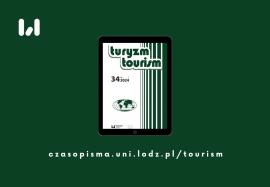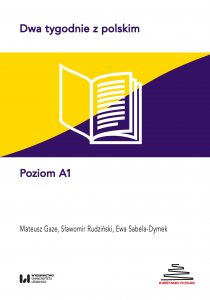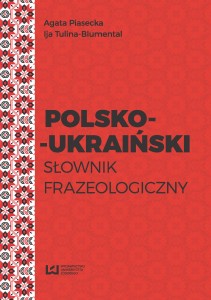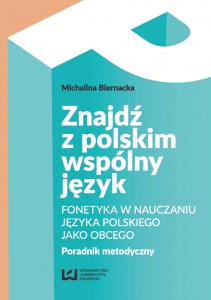Turyzm | Vol. 34 No. 1 (2024)
Opublikowano: 1 lipca 2024

Turyzm jest najstarszym polskim czasopismem naukowym o tematyce turystycznej. Wydawany jest przez Instytut Geografii Miast i Turyzmu Uniwersytetu Łódzkiego nieprzerwanie od 1985 r. Jest jednym z niewielu tytułów w Polsce skierowanych do naukowców reprezentujących różne dyscypliny i zajmujących się problematyką turystyczną, w tym przede wszystkim do geografów, ekonomistów, socjologów oraz przedstawicieli innych nauk społecznych. W latach 2001-2022 czasopismo było dwujęzyczne (język polski i angielski). Od 2023 r. publikowane są tylko artykuły w języku angielskim.
W numerze:
Workplace experiences and career advancement prospects for women in the hotel industry in India
Sarah Hussain, Gagandeep Soni, Tracy Harkison, Frederick DeMicco
This study aims to provide an insight into the factors that affect workplace experiences and opportunities for career progression of female employees in the Indian hotel industry. It provides a much-needed perspective on the work-life of women in the Indian hotel industry. The study had two phases: a systematic literature review was conducted for the first phase and the second phase included conducting semi-structured in-depth interviews. The findings of this study reveal that working in the hotel industry remains an ultimate choice for women where they have the opportunities to connect and socialize, enjoy and learn amidst the various challenges and barriers faced. The issue of gender is irrelevant for the women who set their standards and want to achieve their goals. Women show resilience and work against all odds with self-motivation to reach these goals.
Hospitality and anti-tourist attitudes through the host-guest relationship in the Westworld science fiction series
José Ramón Cardona, María Dolores Sánchez Fernández, Jakson Renner Rodrigues Soares
Westworld is a science fiction series that proposes a theme park of the future where ‘guests’ can live a Wild West experience without restrictions or reprisals, thanks to reallooking android ‘hosts’ who grant all their wishes. Due to the topic covered, this science fiction series allows its use as a common thread for an article that considers the concept of hospitality, the host-guest relationship and its consequence for the management of tourist destinations. This is achieved through an exegesis of Westworld and an analysis of academic bibliography. First, different concepts of hospitality and what they imply for the host-guest relationship are identified. Subsequently, how different theoretical developments on the resident-tourist relationship are proposed entailing different interpretations and reactions to the same objective reality. In conclusion, it should be noted that when tourism is perceived as subordinating the host to the wishes of the guest (as in Westworld), the appearance of anti-tourism attitudes among residents is only a matter of time, generating conflicts. Furthermore, the importance of dominant interpretive theories in determining the reaction of the local population to events that occur should be highlighted.
Implementation of the ecohumanist concept in the Grand Maerakaca tourism space, Semarang, Indonesia
Suzanna Ratih Sari, Fadhil Muhammad, Muhammad Fariz Hilmy
The aim of this study is to explain the implementation of ecotourism and the humanist (eco-humanist) perspective in the tourism space of Grand Maerakaca. This research has used qualitative methods to explore issues related to these concepts as implemented in Grand Maerakaca. Observations and interviews with tourists from various demographic segments were conducted to get information related to their ability to access ecotourism spaces. The results show that not all tourist providers in Grand Maerakaca implement the eco-humanist concept such as shown by the absence of local community participation and the empowerment of vulnerable groups. Besides, some tourist paths are inaccessible and dangerous for older tourists and children. Some of these are reasons why Grand Maerakaca is not attractive to tourists. The findings were analyzed using descriptive analysis techniques to obtain a perspective related to ecohumanist implementation in Grand Maerakaca. The output of this research is to suggest forms of this implementation in tourist spaces in Grand Maerakaca that can accommodate all tourists and can increase tourist visits.
Agritourism in academic research: Literature review and cluster analysis
Michał Roman, Norbert Kawęcki
The aim of the article is to review the current literature in the field of agritourism. The data for the analysis was collected from the Web of Science database from 1990–2022: a total of 1,834 bibliometric publication records. The article presents both quantitative and qualitative analysis. The results indicated five main research areas: (a) the impact of the attitudes of the community on the perception and management of ecotourism and agritourism; (b) the impact of models of the perception of the quality of services in agritourism on customer satisfaction; (c) the quality of services and tourist culinary experiences that motivate the choice of agritourism destinations; (d) the typology of agritourism farms and their differentiation in the development of rural tourism; (e) the impact of state policy on the management of rural tourism and agritourism. The limitations of the conducted research, which mainly concern the methodological part, should also be borne in mind: including the selected publication database, and search criteria such as publication year or language.
Assessing global perceptions of India: Policy implications drawn from foreign tourism narratives
Rahul Pratap Singh Kaurav, Snigdha Kainthola, Ruturaj Baber, Pinaz Tiwari
This study scrutinizes India’s growing appeal as a tourist destination, accentuated by government initiatives and innovative tourism policies like the e-visa program, Incredible India Campaign 2.0 and digital advancements in the travel sector. With the diminishing impact of COVID-19, there is a noticeable surge in various forms of tourism – inbound, outbound and domestic. The primary focus is to understand the driving factors behind the choice of India as a destination for inbound tourists. This research delves into these motivations, providing a global perspective on India’s attractiveness. A mixed-method approach was employed, utilizing convenience sampling for data collection. The quantitative analysis was based on a survey, informed by a literature review, comprising 390 respondents from 10 diverse Indian destinations. Additionally, 25 qualitative interviews were conducted, aiming to enrich and triangulate the quantitative findings. Exploratory factor analysis (EFA) revealed five predominant motivations among inbound tourists: culinary interests, spiritual pursuits, budget-consciousness, cultural curiosity and natural allure. These findings were substantiated through thematic analysis. The outcomes have significant practical ramifications for destination managers and tourism policy developers in India. By understanding these key motivators, they can devise targeted strategies for enhancing the appeal of India to these specific tourist segments. This study not only aids in refining tourism promotion efforts but also contributes to the academic discourse on tourist motivation offering a fresh international perspective on India’s image as a tourist destination.
International retirement migration for Japanese retirees: Motivational push-pull factors and behavioral phenomena towards cultural assimilation
Siti Hajar Binti Rosli
This article examines push and pull factors for Japanese retirees in Thailand as part of international retirement migration (IRM). Additionally, it studies levels of social integration, subjective wellbeing, life satisfaction, cultural assimilation and factors that hinder it. It examines the moderating and mediating effect of the relationship between independent and dependent variables. A quantitative method using a questionnaire was used and found that economic, health and social factors are significant in influencing retirees’ push and pull motivations. As for social integration, subjective well-being, life satisfaction and cultural assimilation, there is positive feedback from retirees. Factors that hinder cultural assimilation are language barriers and cultural differences. The results show a positive and strong association between language acquisition and social integration, between social integration and cultural assimilation, and between attitudes and cultural assimilation. There is a moderating effect between language acquisition and cultural assimilation. The results also show that there is no mediating effect for local support on the relationship between attitudes and social integration.
Motivational push and pull factors influencing intentions to revisit Jordan as a MICE destination
Ammar Ramadan, Azilah Kasim
The main objective of this study is to examine the impact of push and pull factors on the intentions of international participants to revisit MICE events held in Amman, given that there are very few existing studies on the topic. This research is quantitative and employs a questionnaire method to collect data. For data analysis, partial least squares structural equation modelling (PLS-SEM) was utilized to test the research hypothesis with a purposive sample of 479 international visitors who had attended 14 MICE events held in Amman in 2022. The study revealed that networking opportunities, educational opportunities, destination image, travel cost, destination attraction and accessibility have a significant positive impact on revisit intentions. In terms of implications, these findings contribute to enriching push and pull theory in this context among MICE participants. In practical terms, the findings contribute to empowering planners, managers, marketers and organizers in the MICE industry in terms of creating and promoting effective strategies related to MICE tourism. The findings are anticipated to be useful for conference organizers, enabling them to attract repeat participants in this extremely competitive event industry.
The U-shaped relationship between corruption and international tourism demand: A gravity model approach
Gül Erkol Bayram, Abdul Rehman Abbasi, Ali Raza, Ahsan ul Haque Shaikh, Suhaib Ahmed Soomro
The tourism industry significantly contributes to a country’s economic growth and creates a positive image of the destination. This study assesses the impact of corruption on international tourism demand. It employs two-dimensional analyses using the gravity model and a pooled ordinary least square estimator to provide a unique recognition of international tourism demand. The study utilized a conditional quantile regression technique to analyze a dataset of 200 destination countries from 1995 to 2022. The empirical results demonstrate a mixed effect of corruption on international tourism demand. The analysis reveals a non-linear relationship between corruption and international tourism demand, with the inverted-U relationship being statistically significant only at the 50th–75th quantiles and not holding at the upper and lower quantiles. The research confirms that income has a positive impact on tourism across quantiles, but the impact is disproportionate. The sub-period of 2006–2022 experienced a significant decline in gross domestic product (GDP) due to the global financial crisis and its aftershocks, which severely impacted the attractiveness of destination countries for tourists. These valuable insights can inform national tourism policies and businesses.
Destination brand identity as a mediator between accessibility and tourist perception: Promoting Bama Yao as potential wellness tourist destination in China
Linwei Yan, Elangkovan Narayanan Alagas, Manimekalai Jambulingam, Lei Wang
This study aims to examine the impact of accessibility and destination brand identity on Chinese wellness tourist perceptions. It considers Bama Yao autonomous district’s growth towards longevity tourism and contributes to empirical work on the Chinese wellness tourism market. This quantitative research incorporated a post-positivism paradigm with the non-probability convenience sampling method to collect paper-based questionnaires: a total of 346 were coded for data analysis. The results demonstrated that accessibility positively influenced destination brand identity and tourist perceptions. Equally destination brand identity positively influenced tourist perception. Meanwhile, destination brand identity mediated the relationship between accessibility and tourist perception for wellness tourism destinations. However, the cross-sectional study’s results cannot be generalizable, and the sample may be one of its limitations. The present study provides policymakers and practitioners with the theoretical and practical basis to understand and predict tourists’ perceptions of wellness tourism destinations in China.
Tourist lifestyle: Food and travel activities at a gastronomy destination in Türkiye through the mediating role of destination familiarity
Uzeyir Kement, Murat Göral, Yusuf Bayatkara, Yakup Durmaz, Gül Erkol Bayram
This work aims to determine the effect of the travel preferences of domestic and foreign tourists visiting Gaziantep province in Türkiye and their participation in destination food and travel activities, as well as examining the mediating role of destination familiarity. The research model includes three sub-factors for travel lifestyle: preference for proximity and comfort, interest in new and local culture, and preference for activities and adventures. While preference for destination food activities has two sub-factors: interest in food activities and tasting local flavors. Additionally, destination familiarity and preference for destination travel activities are the measures used in the research model. The research sample consists of domestic and foreign tourists visiting Gaziantep between March and April 2022; 418 questionnaires were filled in by participants chosen by random sampling. Data analysis was made using SPSS and SmartPLS. As reflective and formative scales were used together in the data analysis, the partial least squares method (PLS-SEM) was used. The research results suggest that preference for proximity and comfort, interest in new and local culture, preference for activities and adventures, and destination familiarity have a positive significant effect on interest in food activities. While interest in the new and local culture and preference for activities and adventures, have a positive significant effect on tasting local flavors; preference for proximity and comfort and destination familiarity do not have such an effect. It was also found that preference for proximity and comfort, interest in the new and local culture, preference for activities and adventures, and destination familiarity have a positive and significant effect on preferences for destination travel activities. Lastly, interest in new and local culture and preference for activities and adventures have a positive significant effect on destination familiarity while preference for proximity and comfort do not.
Oud Batavia as a heritage site within Jakarta: Tourist revisit intentions
Anita Maulina, Iwan Sukoco, Bambang Hermanto, Nenden Kostini, Nur Fitri Rahmawati, Hartono Hartono
The main objective of this study is to explore the dynamics of heritage tourism in Oud Batavia, the Old City of Jakarta, specifically focusing on perceived price, perceived authenticity and perceived value, and how they influence tourist satisfaction and revisit intentions. By using a quantitative design, data was collected from 406 valid responses through a questionnaire distributed in the Old City. The findings confirmed positive and significant relationships highlighting the importance of preserving historical buildings and emphasizing the role of perceived factors in enhancing the overall tourist experience. The study contributes valuable insights for stakeholders, urging the Jakarta city government and the Ministry of Tourism to focus on preserving cultural heritage buildings and employ adaptive reuse strategies to increase tourist visits. The limitations of the study include its exclusive focus on domestic tourists in the Old City of Jakarta, suggesting avenues for future research to explore broader topics such as city branding and foreign tourist perspectives. The study concludes with recommendations for strategies to commercialize historical tourist destinations and a call for United Nations Educational, Scientific and Cultural Organization recognition of the Old City as a world historical heritage site.
An analysis of Pakistan’s destination attributes and their effects on international tourists’ intentions to visit
Abdul Rauf, Vanessa de Oliveira Menezes, Waleed Jawaid
This paper aims to generate a clear understanding of Pakistan’s important attributes and their direct and indirect influence via perceived destination images on international tourists’ intentions to visit for a holiday. It employed quantitative research methods through the use of a correlation research design. Both direct and indirect effects of destination attributes on visit intentions were examined and a self-administered online survey was distributed across several social media platforms. The results of multiple regression analysis revealed that landscape, services, local attitudes toward tourists, safety and risk, sport and special events were found to be statistically significant predictors of such intentions. However, all the destination attributes were found to have an indirect influence on international tourists via the perceived destination image of Pakistan.
A tourist facility with a ban on children playing: The principle of non-discrimination and the statement of the Bulgarian court
Tanya Yoncheva
Recently, both in Bulgaria and abroad, it is increasingly common to find accommodation, restaurants and entertainment facilities that advertise and offer a wide range of services. However, these are not intended for general consumers but only those who have reached maturity (excluding minors and the under-aged). According to press publications hotels and restaurants that pre-select their guests based on their age are mainly concentrated on the Bulgarian Black Sea coast and in the mountains or they specialize in spa and balneo procedures. It turns out that consumers find it easier to stay with a pet, albeit at an extra cost, than go on vacation with their teenage children. Such practices adopted by representatives of the tourism industry raise some questions of a moral, ethical and legal nature. The current article traces the development of a specific administrative and judicial proceeding initiated to establish the presence of discrimination against consumers in a tourist facility – a restaurant. An overview of the claims and arguments of the claimant is made as well as an analysis of the reasons and considerations given by the competent administrative and judicial authorities. The author’s opinion on the issue is expressed.
Digital mapping of tourism destinations in Bangka Regency based on the wellness tourism model
Devi Valeriani, Dian Prihardini Wibawa, Revy Safitri, Rion Apriyadi
In the dynamic landscape of global tourism, a notable shift has occurred with the rising importance of wellness tourism. This research aims to systematically identify and evaluate tourism destinations within Bangka Regency that have successfully implemented indicators of the wellness tourism model. The study employs scalogram analysis to assess the service capacity of these destinations for visitors, considering factors such as accessibility, facilities, attractions, destination cleanliness and the implementation of health protocols. The findings reveal a nuanced categorization of destinations into five groups. From the 14 samples, approximately 34.71% of the destinations exhibit extensive facilities (I), while 14.29% possess satisfactory (II), another 14.29% have adequate (III) and again of 14.29% have destinations with less than adequate (IV). Furthermore, 21.42% of the destinations are characterized by insufficient (V). The identified groupings offer insights for policymakers, stakeholders and businesses to enhance wellness tourism experiences, thereby contributing to the overall development of the tourism sector in the region.
Komentarze
Ten post dostępny jest także w języku: angielski





